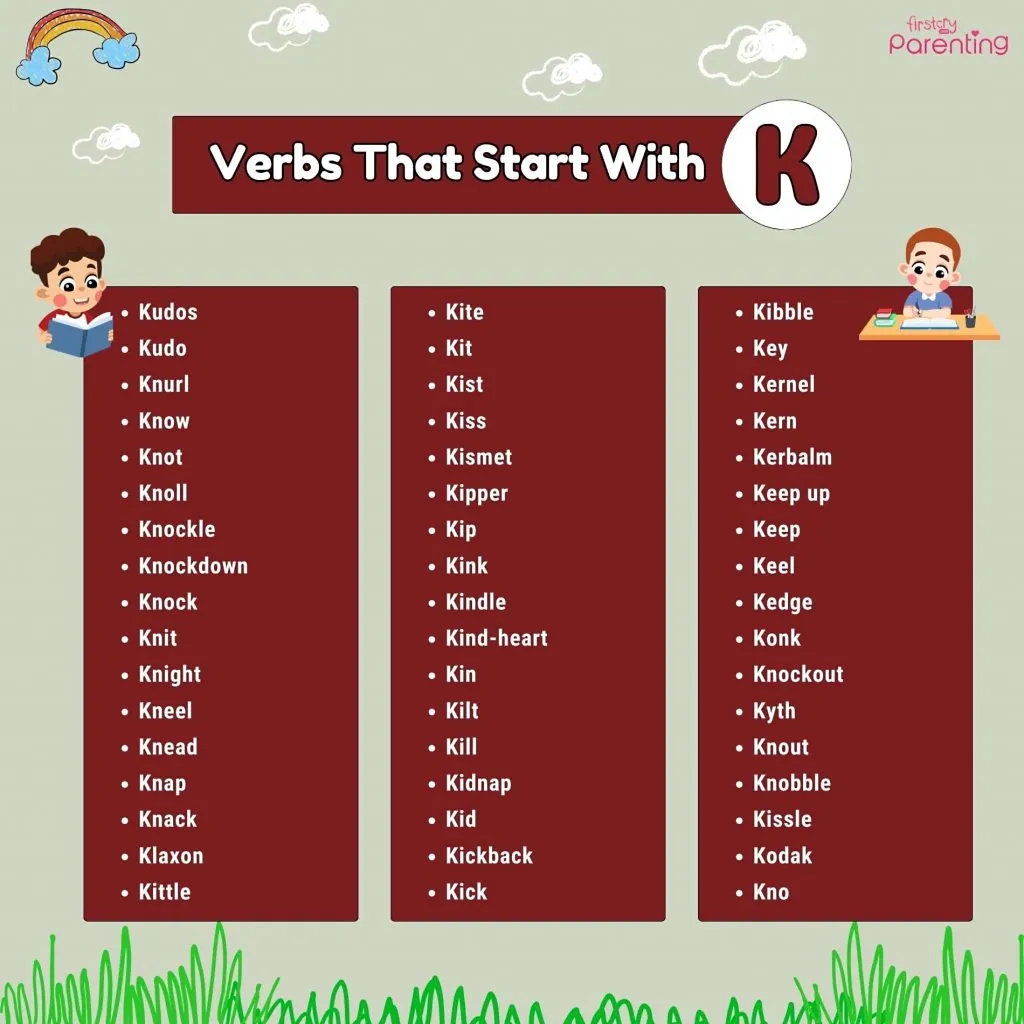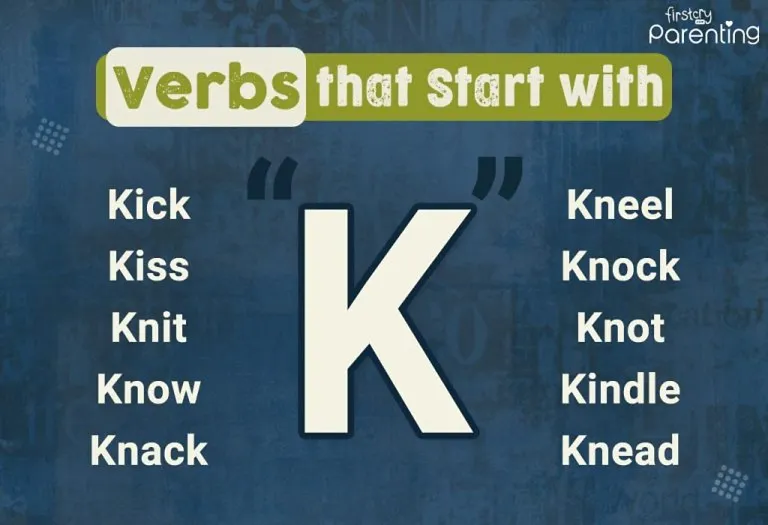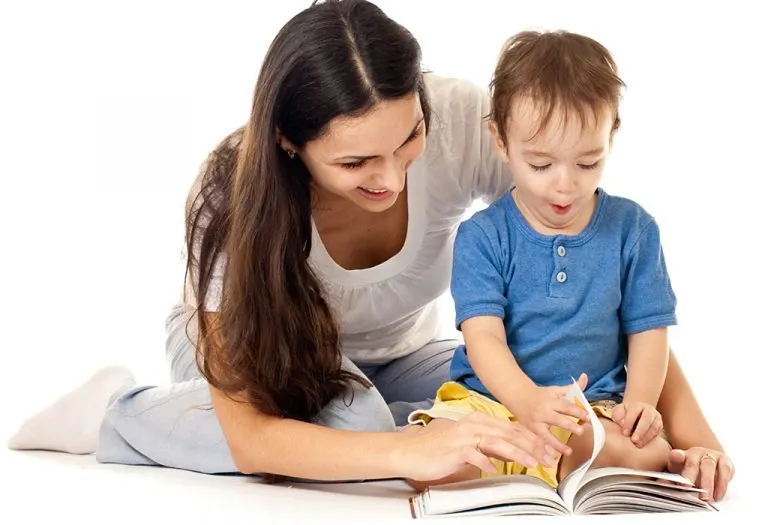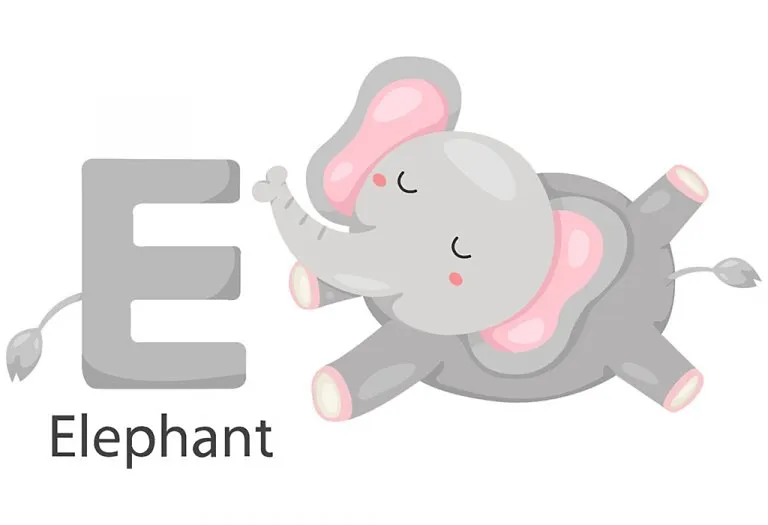Verbs That Start With Letter “K” in English
- What Are the Verbs Beginning With K?
- Common Verbs Starting With K
- Action Verbs That Start With K
- Positive Verbs That Start With K
- More Verbs That Begin With K
- FAQs
- Also, Discover the Verbs That Start With A to Z
Embarking on the adventure of learning English can be thrilling and challenging, especially for our youngest learners. Building a robust vocabulary is one of the foundational pillars of mastering any language. Today, we’re diving into a specific and often overlooked segment of the English language: verbs that start with “K.” This exploration isn’t just an academic exercise; it’s a fun and engaging way to enrich the vocabulary of preschoolers and kids. By focusing on “verbs that start with K for preschoolers and kids,” we’re tailoring our journey to be both educational and accessible. The aim is to create a vibrant tapestry of words that enhances vocabulary for kids and sparks their imagination and curiosity about language. Join us as we uncover the meanings and examples of these unique verbs, making each discovery a stepping stone to linguistic proficiency and a love for English that will last a lifetime.
What Are the Verbs Beginning With K?
Verbs starting with K might seem like a rare find in the vast ocean of English, but they are indeed present and full of character. These “verbs with K” encompass actions ranging from every day to the extraordinary, painting vivid pictures with meanings and applications. As we delve into this unique category, we’ll discover verbs that enhance our vocabulary and add a sprinkle of intrigue to our conversations and writings.
Common Verbs Starting With K
Diving into the realm of English verbs, starting with K, opens up a world where actions speak louder than words. Although less common than those beginning with more frequent letters, these verbs hold their ground by being descriptive and dynamic. From expressing movement and change to conveying emotions and actions, each verb beginning with K adds a unique flavour to the sentences it graces. Let’s explore 15 of these captivating verbs, understanding their meanings and seeing them come to life in example sentences.
1. Keel
To fall or to cause to fall over; to turn over or to capsize.
Example: The boat keeled over in the strong wind, throwing the sailors into the water.
2. Keep
To retain possession of; to continue having or holding.
Example: She keeps her grandmother’s ring in a safe place.
3. Kick
To hit with the feet.
Example: The soccer player kicked the ball into the goal with precision.
4. Kick-start
To start (a motorcycle) by pushing down on a lever with your foot; to start or restart something rapidly or forcefully.
Example: He kick-started his motorcycle and sped off down the road.
5. Kindle
To start a fire, to light up, illuminate, or make bright.
Example: We kindled a fire to keep warm under the stars.
6. Kink
To form or cause a sharp twist or curve.
Example: The garden hose kinked and stopped the flow of water.
7. Kiss
To touch with the lips slightly pursed, then to part them and to emit a smacking sound in an expression of love, greeting, reverence, etc.
Example: The mother gently kissed her child goodnight on the forehead.
8. Knack
To have a unique talent or skill in doing something.
Example: He has a knack for making friends quickly.
9. Knead
To work and press into a mass with or as if with the hands, especially to work (as dough) into a uniform mixture by pressing, folding, and stretching.
Example: The chef kneaded the dough until it was smooth.
10. Kneel
To go down or rest on the knees or a knee.
Example: The knight kneeled before the queen as a sign of respect.
11. Knit
To make (a garment, fabric, etc.) by interlocking loops of one or more yarns with knitting needles or by machine.
Example: She knit a warm sweater for the winter months.
12. Knock
To strike a door, window, etc., with the knuckles, a hard object, or a mechanical device to attract attention or gain entry.
Example: He knocked on the door before entering the room.
13. Knot
To tie or secure with a knot.
Example: She knotted the rope tightly to ensure the boat remained anchored.
14. Know
To be aware of through observation, inquiry, or information.
Example: I know the answer to your question.
15. Kvetch
To complain habitually, gripe; often used humorously or affectionately.
Example: My grandfather likes to kvetch about the weather, but he’s just making conversation.
Action Verbs That Start With K
Action verbs that start with the letter K are like hidden gems in the treasure chest of the English language. They bring energy and motion to our sentences, driving stories forward and illustrating our intentions with clarity and power. From kinetic movements to expressions of care, these verbs showcase the vast array of actions one can describe with just the initial ‘K’. Let’s leap into the action and explore 15 action verbs that start with K, each accompanied by its definition and a vivid example to bring its usage to life.
1. Kedge
To move a ship by hauling on an anchor.
Example: The sailors had to kedge the ship through the narrow channel.
2. Keelhaul
To punish by dragging under the keel of a ship.
Example: In pirate lore, offenders were often keelhauled for their misdeeds.
3. Kerfuffle
To make a fuss or commotion.
Example: The meeting was kerfuffled by an unexpected interruption.
4. Key
To enter or operate something with a key or keyboard.
Example: She keyed in the code to unlock the door.
5. Kibble
To grind or crush food into small pellets.
Example: The machine kibbled the grains into bite-sized pieces for the pet food.
6. Kibitz
To offer unsolicited advice or commentary.
Example: To everyone’s annoyance, he couldn’t help but kibitz during the card game.
7. Kibosh
To put an end to; to halt.
Example: The unexpected rain put the kibosh on our outdoor picnic plans.
8. Kidnap
To seize and detain unlawfully and usually for ransom.
Example: The movie plot revolves around a detective trying to find a child who was kidnapped.
9. Kill
To cause the death of a living organism.
Example: The hunter killed the wild game for food.
10. Kipper
To preserve fish by salting and smoking.
Example: They kippered the herring for a savoury breakfast treat.
11. Kirtle
To dress or attire oneself.
Example: She kirtled herself in her finest gown for the royal ball.
12. Kittle
To tickle or irritate.
Example: The scratchy fabric kittled her skin uncomfortably.
13. Knap
To break sharply; to chip.
Example: The flint knapped against the rock, producing sparks.
14. Knurl
To create a rough texture or pattern on the metal.
Example: The machinist carefully knurled the handle’s surface for better grip.
15. Kowtow
To show obsequious deference or respect; to kneel and touch the ground with the forehead as an act of worship or submission.
Example: In the historical drama, subjects kowtowed before the emperor.
Positive Verbs That Start With K
Positive verbs that start with K bring fresh air into our conversations and writings, sprinkling them with optimism and goodwill. These verbs are like rays of sunshine, highlighting actions that uplift, encourage, and inspire both the speaker and the listener. From acts of kindness to expressions of joy, these verbs paint our interactions with hues of positivity. Let’s embrace the warmth and explore 15 positive verbs starting with K, each described and illustrated through meaningful examples.
1. Kapow
To make a sudden and dramatic impact.
Example: The advertisement campaign kapowed the audience with its creativity.
2. Kaleidophonise
To create harmonious or musical sounds.
Example: The orchestra kaleidophonised the auditorium with their music.
3. Keep up
To maintain at the same level or pace, to continue without falling behind.
Example: She keeps up with the latest trends to stay informed.
4. Keynote
To set the fundamental tone or theme, to serve as the primary focus.
Example: The CEO’s keynote speech highlighted the importance of innovation in the company’s culture.
5. Key up
To make someone excited or to prepare someone for an event.
Example: The coach keyed up the team before the big game with an inspiring talk.
6. Kind-heart
To act with kindness and compassion.
Example: He always tries to kind-heart those who are in need.
7. Kine
To treat with tenderness and care, to cherish.
Example: He kined the old photographs, reminiscing about cherished memories.
8. Kinematise
To animate or bring to life; to make dynamic.
Example: The artist kinematised the characters in his illustrations, giving them a sense of movement and vitality.
9. Kismet
To believe in fate or destiny.
Example: They kismeted that they would meet again someday.
10. Kith
To befriend or welcome warmly.
Example: The community kithed newcomers with open arms.
11. Klatch
To gather socially for conversation and camaraderie.
Example: Friends klatched over coffee at their favourite cafe.
12. Knight
To grant a knighthood to honour or elevate someone.
Example: The queen knighted the brave soldier for his outstanding service to the country.
13. Kudos
To give praise or accolades to someone for their achievements.
Example: He received kudos from the office for completing the project on time.
14. Kvel
To feel happy and proud; to swell with pride or pleasure.
Example: She kvelled over her daughter’s graduation with the highest honours.
15. Kyanise
To treat or cover with a preservative, especially a substance containing cyanide.
Example: The artist kyanised the wood to protect it from decay.
More Verbs That Begin With K

Venturing further into the kaleidoscope of the English language, we uncover even more verbs that begin with the letter K. This exploration brings to light verbs that are seldom heard but equally fascinating, offering new verbal tools for expression and understanding. From actions we perform to those we experience or observe, this comprehensive list broadens our linguistic palette, inviting us to explore and utilise these verbs in our daily communication, creative writing, and beyond.
| Verbs | ||
| Kayak | Kerbalm | Kern |
| Kid | Knab | Kodak |
| Kilt | Kaleidoscope | Kline |
| Kin | Keypunch | Knockdown |
| Kaisen | Klaxon | Knoll |
| Kaolinise | Kickback | Kvitch |
| Kondo | Konk | Kluge |
| Kit | Knell | Kodak |
| Kite | Kineticise | Kno |
| Kist | Kip | Kraken |
| Kissle | Keister | Kudo |
| Kayfabe | Knobble | Knout |
| Kern | Knockout | Kyth |
| Kanoodle | Kerplunk | |
| Kourbash | Kernel | |
FAQs
1. What are some common verbs that start with K for kids to learn?
Some common verbs that start with K for kids to learn include “kick” (to strike with the foot), “kiss” (to touch with the lips as a sign of love or greeting), and “keep” (to retain possession of something).
2. How can learning verbs that start with K improve my vocabulary?
Learning verbs that start with K can enhance your vocabulary by introducing you to various actions and concepts, expanding your ability to express yourself more precisely and creatively in both speech and writing.
Also, Discover the Verbs That Start With A to Z
| Analyse | Navigate |
| Believe | Organise |
| Coordinate | Plan |
| Design | Question |
| Evolve | Read |
| Fly | Study |
| Guide | Think |
| Harmonise | Update |
| Integrate | Verify |
| Jog | Walk |
| Keep | X-ray |
| Learn | Yield |
| Move | Zoom |
Exploring verbs that start with K uncovers a fascinating layer of the English language, filled with dynamic actions and expressive capabilities. Whether for educational purposes, creative writing, or everyday communication, these verbs enrich our vocabulary and enable us to convey our thoughts and emotions with greater nuance and clarity. Embracing these verbs enhances our linguistic skills and opens up new avenues for engaging and connecting with others through the power of words.
Also Read: Verbs That Start With A to Z
| A | B | C | D | E | F | G | H | I | J | K | L | M |
| N | O | P | Q | R | S | T | U | V | W | X | Y | Z |
Was This Article Helpful?
Parenting is a huge responsibility, for you as a caregiver, but also for us as a parenting content platform. We understand that and take our responsibility of creating credible content seriously. FirstCry Parenting articles are written and published only after extensive research using factually sound references to deliver quality content that is accurate, validated by experts, and completely reliable. To understand how we go about creating content that is credible, read our editorial policy here.














.svg)
















